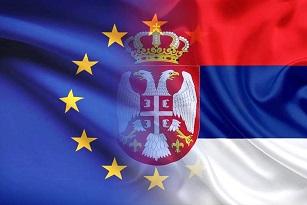
The thirteenth meeting of the Accession Conference with Serbia at Ministerial level was held today in Brussels.
This is the second Intergovernmental Conference since the Council approved the revised enlargement methodology, which also resulted in the opening of Cluster Four - Green agenda and sustainable connectivity. This cluster is comprised of four negotiating chapters: chapter 14 on transport policy, chapter 15 on Energy, chapter 21 on trans-European networks and chapter 27 on environment and climate change.
The European Union delegation was led by Gašper Dovžan, State Secretary at the Ministry of Foreign Affairs, on behalf of the Slovenian Presidency of the Council of the European Union. The Serbian delegation was led by Prime Minister Ana Brnabić.
Bringing enlargement forward has been one of the main priorities of our Presidency, and we are particularly pleased to see the practical implementation of the revised enlargement methodology with the first ever opening of a negotiating cluster. This brings more dynamism to the accession negotiations with the simultaneous opening of four negotiating chapters.
Gašper Dovžan, State Secretary at the Slovenian Ministry of Foreign Affairs
The revised enlargement methodology aims to reinvigorate the accession process. It includes: a stronger focus on fundamental reforms; a stronger political steer; increased dynamism; and a more predictable process, based on objective criteria and rigorous positive and negative conditionality.
Providing the accession process with a stronger political steer from the Intergovernmental Conferences is one of the key elements of the revised enlargement methodology. The meeting therefore served to strengthen the dialogue between the Member States and Serbia focusing efforts on key reforms that should allow for further progress in the accession process.
The advancement of the negotiations will continue to be guided by Serbia’s progress in preparing for accession, as established in the Negotiation Framework. Progress on the rule of law and fundamental rights chapters, as well as on the normalisation of Serbia's relations with Kosovo* as set out in the Negotiating Framework, continues to be essential and will determine the pace of accession negotiations overall.
* This designation is without prejudice to positions on status, and is in line with UNSCR 1244/1999 and the ICJ Opinion on the Kosovo declaration of independence.
Details
- Publication date
- 14 December 2021
- Author
- Directorate-General for Neighbourhood and Enlargement Negotiations
